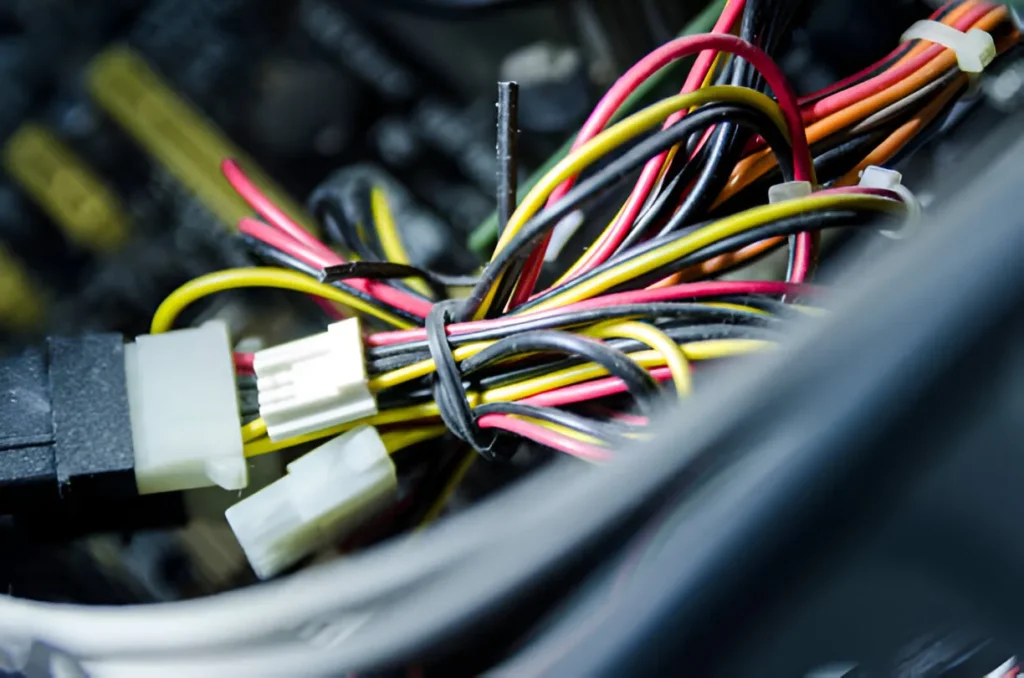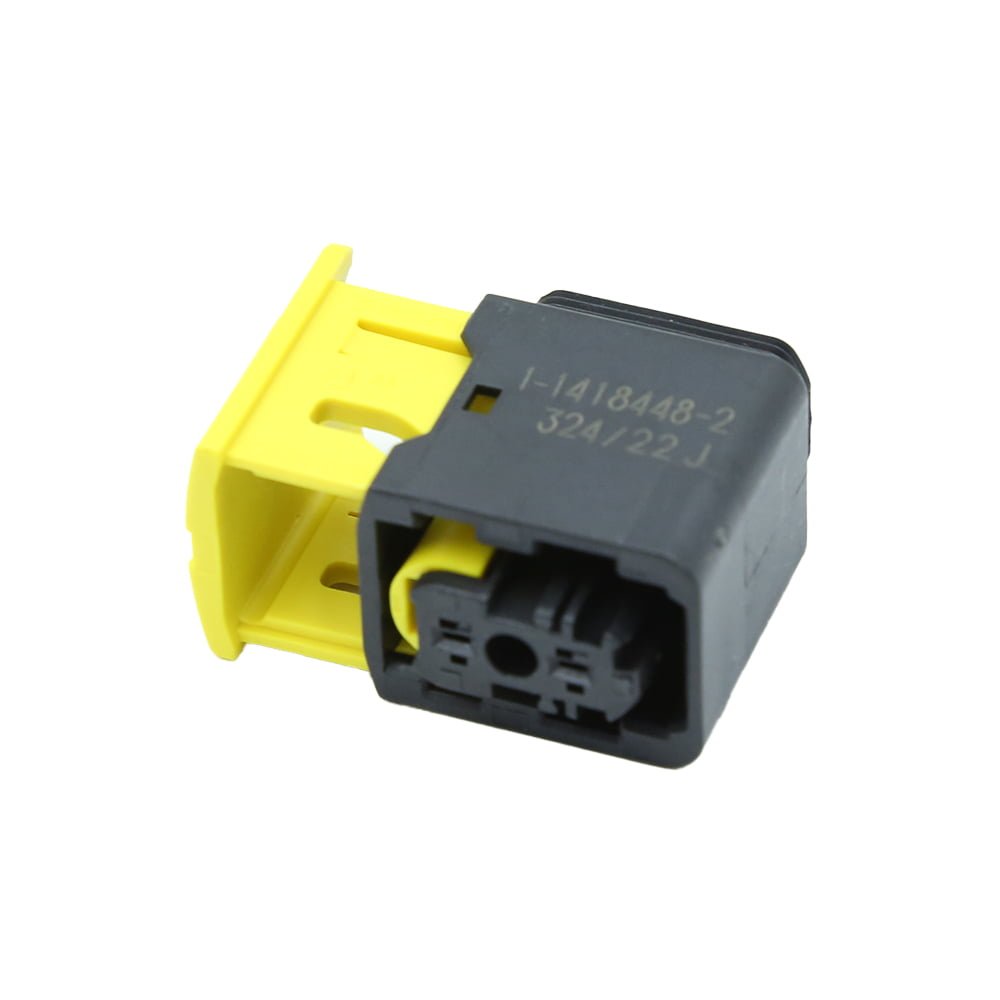LCP materials play an important role in automotive connectors, improving performance and reliability in harsh environments. LCP materials provide exceptional advantages for automotive connectors, including high-temperature resistance, durability, and chemical resilience. Their unique characteristics make them indispensable for modern automotive applications, ensuring safety and efficiency in vehicle performance.
Main Advantages
LCP materials provide several notable advantages when used in automotive connectors:
- High-Temperature Resistance: Capable of withstanding extreme temperatures from 250°C to over 320°C, LCP retains its mechanical properties, making it suitable for high-heat applications.
- Low Dielectric Constant and Loss: With a low dielectric constant and loss, LCP improves signal integrity in high-frequency applications, particularly beneficial for automotive ethernet connectors.
- Dimensional Stability: This material maintains its shape under thermal cycling and mechanical stress, essential for precision connectors that require long-term accuracy.
- Chemical Resistance: LCP resists a wide range of chemicals, making it suitable for harsh automotive environments where exposure to fuels and oils is common.
- Mechanical Strength: High tensile strength and impact resistance allow LCP connectors to endure mechanical stresses without deforming or breaking, crucial for components subjected to vibrations.
- Lightweight: The lightweight nature of LCP contributes to vehicle efficiency by improving fuel economy and performance.
- Self-Extinguishing Properties: Being inherently flame-retardant enhances safety by lowering fire risks during electrical malfunctions.
- Vibration Damping: Its ability to absorb vibrations helps maintain connection integrity in dynamic environments.
Durability of LCP Material in Automotive Connectors
LCP materials are highly durable when used in automotive connectors. Key aspects of their durability include:
- High-Temperature Stability: Operating effectively at temperatures from 250°C to over 320°C ensures that LCP connectors maintain their mechanical properties without deformation under prolonged heat exposure typical in automotive settings.
- Low Coefficient of Thermal Expansion (CTE): A very low CTE minimizes dimensional changes during thermal cycling, preventing issues like delamination or cracking from expansion mismatches between different materials during temperature changes.
- Mechanical Strength: The molecular structure of LCP provides excellent tensile strength (150 MPa to 300 MPa), enabling connectors to resist mechanical stresses like vibrations and shocks.
- Chemical Resistance: Resistant to various chemicals including automotive fluids, LCP helps maintain connector integrity even in harsh conditions.
- Dimensional Stability: It retains its shape over time under mechanical stress or temperature variations, crucial for precision applications requiring accurate connections.
- Vibration and Impact Resistance: Designed to withstand vibrations and impacts without losing functionality, LCP connectors are reliable in systems that experience frequent movement or jolts.
- Self-Extinguishing Properties: Being flame-retardant reduces fire hazards during electrical malfunctions, adding safety in automotive applications.
In summary, the durability of LCP materials in automotive connectors is attributed to their high-temperature resistance, low thermal expansion, mechanical strength, chemical resilience, and stability under stress. These properties make them ideal for ensuring long-lasting performance across various automotive applications.
Thermal Stability of LCP Materials in Automotive Connectors
LCP materials demonstrate exceptional thermal stability, making them well-suited for automotive connectors. Key aspects include:
- High Operating Temperature: Effective at temperatures exceeding 250°C ensures that connectors remain reliable even under extreme conditions found in engine compartments.
- Low Coefficient of Thermal Expansion (CTE): A very low CTE minimizes dimensional changes during thermal cycling, preventing warping or cracking that can occur with other materials during temperature fluctuations.
- Resistance to Thermal Degradation: Excellent resistance allows LCP to maintain its mechanical and electrical properties after prolonged exposure to high temperatures without significant performance loss.
- Stability Under Temperature Fluctuations: Designed to endure rapid temperature changes without significant alterations or degradation ensures reliability in applications experiencing sudden temperature shifts.
- Mechanical Strength Retention: Even at elevated temperatures, LCP retains its mechanical strength, ensuring that connectors do not fail under stress from vibrations or shocks common in automotive settings.
- Self-Extinguishing Properties: Inherently flame-retardant characteristics provide added safety against electrical malfunctions or fire sources.
Specific Applications of LCP Materials in Connectors
LCP (Liquid Crystal Polymer) materials are increasingly utilized in automotive connectors due to their distinctive characteristics.
Here are some specific uses of LCP in this field:
- High-Temperature Applications: LCP performs well in high-temperature environments, making it ideal for components exposed to significant heat, such as those found in lighting systems and engine compartments.
- Precision Connectors: The ability to mold LCP into intricate and thin-walled designs allows for the creation of compact and lightweight connectors, which are crucial as vehicles become more electrified.
- Electrical Components: LCP is used in various electrical parts, including sensors and solenoids. Its excellent dielectric properties ensure reliable operation in high-frequency applications, vital for automotive electronics.
- Miniaturization: With the automotive industry’s shift towards smaller components, LCP’s ability to maintain dimensional stability while being molded into tiny parts makes it suitable for high-density electronic applications.
- Durability and Reliability: LCP connectors show high resistance to moisture and chemicals, ensuring long-term reliability even in harsh automotive environments. This makes them suitable for fuel systems and safety belt sensors.
- Vibration Resistance: The material’s natural vibration-damping properties make it suitable for areas near engines and motors, where resonance can be problematic.
- Signal Integrity: In high-speed data transmission applications like automotive ethernet connectors, LCP maintains signal integrity due to its low dielectric constant and loss characteristics.
In summary, the thermal stability of LCP materials is characterized by the ability to work at high temperatures, low thermal expansion, not easy to degrade, and the ability to maintain mechanical strength, which significantly improves the performance and reliability of automotive connectors. These characteristics make LCP materials an ideal material for providing reliable performance in challenging automotive environments and the first choice for manufacturers who meet the needs of modern automotive technology.


